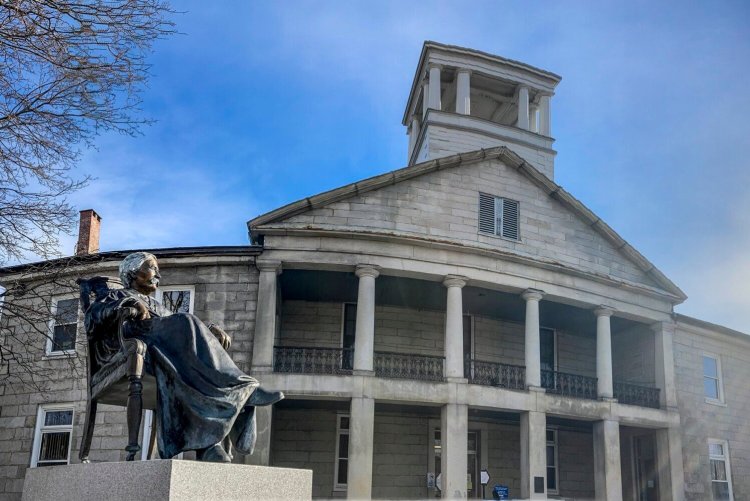AUGUSTA — The controversial statue of Melville W. Fuller, the only U.S. Supreme Court chief justice to come from Augusta but whose legacy included enshrining racial segregation, could soon find a new home at a proposed museum at State and Winthrop streets in Augusta.
Documents on file with the city’s planning bureau offer details of the Maine Judicial Heritage Society Memorial Museum at the former site of the Augusta YMCA, across the street from where the statue now sits outside the Kennebec County Courthouse at 95 State St.

The site plan indicates the 1.06-acre lot, which Robert Fuller Jr. bought in April 2021, would become home to a statue, a 600-square-foot maintenance building, an educational area and a small parking lot. The statue was not specifically identified.
Robert Fuller Jr. donated the statue in 2013 to Kennebec County to mark the 125th anniversary of the elder Fuller’s appointment to the Supreme Court of the United States.
Fuller’s plans for a museum, however, came about nine months after he agreed to take back the statue.
The Maine Supreme Judicial Court sent a letter to the Kennebec County Commissioners in August 2020 asking that county officials consider the statue’s removal from the courthouse grounds. At the time, protests were being held across the country, highlighting instances of violence against Black people, sometimes at the hands of police departments. Those protests resulted in the removal of statues of Confederate Army officers and soldiers, Christopher Columbus and others who supported or promoted racist policies.
Melville Fuller was the chief justice of the country’s highest court when it decided Plessy v. Fergusson, the landmark decision that established the “separate but equal” doctrine that paved the way for decades of racial segregation at public facilities if the segregated facilities were equal in quality. While he did not write the decision, Fuller sided with the majority of justices in the case.
In the August 2020 letter to commissioners, acting Chief Justice Andrew Mead, writing on behalf of the Maine Supreme Judicial Court, said Maine judicial officers had reached a consensus that the statue, at its location in front of the Kennebec County Courthouse, “is not consistent with our values, because the association between Chief Justice Fuller and the Plessy decision is so profound, and Maine judges do not want to be linked with that association.”
Following a public hearing in December 2020, the Kennebec County Commissioners appointed a committee to make a recommendation on where to move the statue. Over the course of the committee’s deliberations, Robert Fuller Jr. offered to take back the statue and pay for its removal.

Rain dampens the statue recently of former U.S. Supreme Court Chief Justice Melville W. Fuller, who has been given a knit hat to wear, outside the Kennebec County Courthouse at 95 State St. in Augusta. One of Fuller’s descendants, Robert Fuller Jr., is proposing to build a museum nearby for the statue after the county commissioners voted last year to move the statue from the courthouse grounds. Andy Molloy/Kennebec Journal
Commissioners agreed in April last year, conveying the statue for $1 and setting a 12-month timeline for the statue to be moved to a new location.
Melville Fuller was born in Augusta in 1833. After graduating from Bowdoin College in Brunswick, he became a lawyer and shortly afterward moved to Chicago. President Grover Cleveland appointed him to the U.S. Supreme Court in 1888 and he was sworn in that year. Fuller served 22 years, until his death in 1910.
Betsy Poulin, the city planner for Augusta, said before this, the First Amendment Museum was the most recent museum in Augusta to undergo review. Work on the Gannett House, the historic building that houses the museum, began in 2016.
Earlier this month, Louisiana Gov. John Bel Edwards signed a posthumous pardon for Homer Plessy, a biracial man who was charged with violating the Separate Car Act in 1892, when he bought a first class train ticket for a “whites only” car and refused to leave when asked. The case was appealed to the U.S. Supreme Court.
According to application materials on file with the city of Augusta, the museum proposed by Robert Fuller Jr. would be open from 10 a.m. to 4 p.m. on Monday through Friday from May to October.
Fuller did not respond Wednesday to a request for comment.
Access to the park would be through the main gate on State Street, and eight parking spaces on Oak Street would be available to visitors. The spaces would also serve as overflow parking for the Lithgow Public Library, located across State Street from the proposed museum site.
The articles of incorporation for the Maine Judicial Heritage Society were filed Sept. 1, 2021. Augusta lawyer Stephen Smith, who had represented Fuller in hearings and meetings with the Kennebec County Commissioners, is the registered agent. Smith did not return a call Wednesday for comment.
The Augusta Planning Board is scheduled to meet at 7 p.m. Tuesday, Feb. 8, for a public hearing on Robert Fuller Jr.’s proposal and other projects. The meeting is set for the council chamber at City Center Plaza, 16 Cony St.
Send questions/comments to the editors.



Success. Please wait for the page to reload. If the page does not reload within 5 seconds, please refresh the page.
Enter your email and password to access comments.
Hi, to comment on stories you must . This profile is in addition to your subscription and website login.
Already have a commenting profile? .
Invalid username/password.
Please check your email to confirm and complete your registration.
Only subscribers are eligible to post comments. Please subscribe or login first for digital access. Here’s why.
Use the form below to reset your password. When you've submitted your account email, we will send an email with a reset code.